what to do when college is not the best time of your life
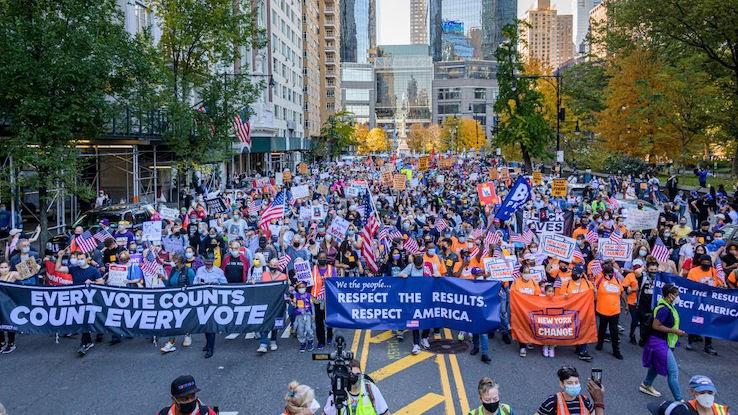
While the Electoral Higher is every bit old as the American Constitution, it'southward also been controversial since the very start of the country. And it remains a point of contention even today — particularly today in the aftermath of the 2020 presidential election. In the wake of his historic loss, Donald Trump has been "pressing his aides on whether Republican legislatures in central states could overturn the results of the presidential election and pick pro-Trump electors," noted Jamelle Bouie, a columnist for The New York Times. The fact that this would even theoretically be possible — that the electors could this hands be manipulated and the will of the American people this hands and purposefully ignored — highlights how undemocratic relying on the Electoral College has the potential to be. And this controversy is resulting in renewed cries to abolish the arrangement of people who ultimately cull the president.
As Americans once once more endure heated dissent surrounding an election, more than 60% take indicated they're in favor of eliminating the Electoral College completely and relying solely on the popular vote to determine the outcomes of presidential elections. As these calls to dissolve the system intensify, the very existence of the process is being called into question. But what'southward the full reasoning backside this, what would the elimination of the Electoral College wait similar and how difficult would its removal be to accomplish? Similar many concepts in American politics, understanding the answers requires a deeper dive into the history, arguments and potential solutions.
What Does the Electoral College Do, and How Does It Work?
When it comes to electing most country and federal officials — like governors, Senators, Representatives and others — people vote directly for a candidate, and the person who earns the near votes from the people is deemed the winner; information technology'due south a one-person, ane-vote organisation. In the instance of voting for the president, withal, in that location'due south an extra step in the voting process: vote casting from electors. These intermediaries are nominated — and afterward named following a vote — every 4 years at state-level political conventions by political party committees. These electors are commonly people whom party officials want "to reward for their service to and back up of the political party." They might be elected officials in the state, donors, party activists or others who accept a "personal or professional connection with the party'south candidate." And they're the people who ultimately decide the outcome of a presidential election.
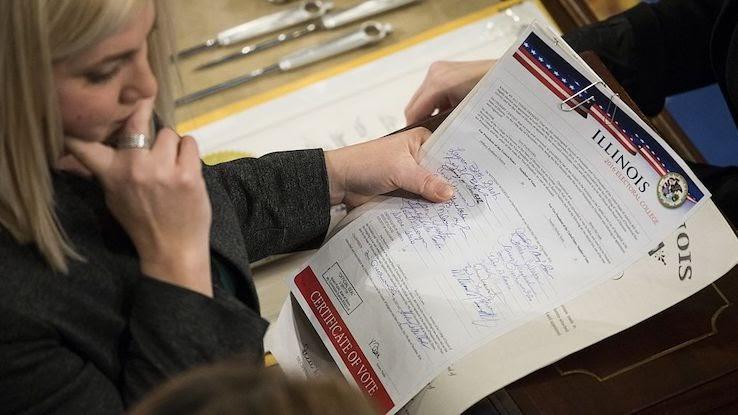
There are 538 electors in all, and the number of electors apportioned to each state depends largely on its population. Each state is entitled to take ane respective elector based on its number of Senators and Representatives in Congress, and Washington, D.C., has three electors of its own. Numbers of electors amidst states vary widely in large part considering the number of Representatives varies. While each state gets ii Senators regardless of its population size, states have different numbers of Representatives due to their differing numbers of congressional districts, which are meant to requite equal political voice to people in every area of a state. States are allocated 1 elector per one Representative to theoretically maintain this equal representation.
Afterward citizens vote, electors do as well; each elector tin bandage one vote. Later determining whom the people in their states voted for, electors are meant to cast their votes to align with the wishes of their states' citizens. Because of this, many states have a "winner take all" policy in which all balloter votes are allocated to the winner of the popular vote in the state — although some states still allow electoral votes to be split to provide proportional representation. A presidential candidate must earn at least 270 electoral votes — just over one-half — to win the race. In the result that no candidate reaches that number, House Representatives choose from amid the top three presidential candidates, with each country getting i vote. The Senate then selects the vice president from the remaining candidates in the aforementioned fashion.
The Balloter College was created for purposes that some of its proponents even so tout as benefits. Amongst several other reasons, the framers of the Constitution proposed the Balloter Higher arrangement considering they worried that the population wouldn't be equipped to make informed voting decisions, and they besides feared that the states that had more voters (or college voting populations) would continually stop up selecting the president. This was essentially a compromise over an existing debate nigh whether Congress or everyday voters should have the power to cull the president. But this debate took place hundreds of years agone, and many of the so-central issues in the argument for creating the Balloter College no longer exist. And in recent times, the Electoral College has caused some unique problems in mod elections.
The Electoral Higher Harms Big States by Stripping Abroad Voting Ability
One of the prominent arguments confronting the Electoral College is that information technology disadvantages big states. Because a state tin have no fewer than three electoral votes — corresponding to 1 Representative plus two Senators — people in minor states become proportionally more say in electing the president than residents of larger states. In 2008, for instance, the 532,668 people of Wyoming had three electoral votes, or one per every 177,556 people. The nearly 25 1000000 people of Texas, by dissimilarity, had but 1 Balloter College vote for every 715,499 people. In other words, a person in Wyoming had about 4 times more voting ability than a Texan did when these statistics were measured. And equally a whole, a state on boilerplate had one electoral vote for every 565,166 people. Those are some jarring discrepancies.
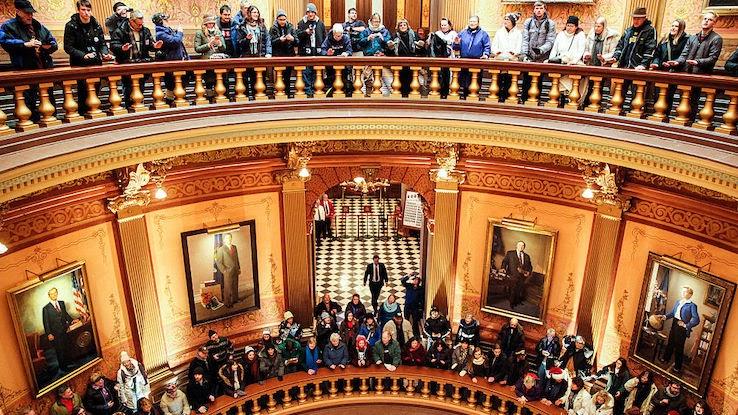
Supporters of the Electoral Higher sometimes argue that information technology offers necessary protections to farmers or rural voters whose votes would otherwise be overwhelmed in bigger states by a popular vote cast largely by urban and suburban voters. However, due to their massive sizes, states like Texas and California have plenty of rural voters and farmers themselves, with the former state having the largest number of farms and the latter the almost money earned from agriculture in the country. Claims that the framers created the Electoral College to guarantee the voice of rural voters also make little sense, as roughly 90% of the population of the country lived on farms several hundred years ago. George Washington and Thomas Jefferson likely never imagined the level of urbanization we accept today.
The Electoral College also disadvantages non just minority ethnic and racial groups, which tend to live forth the Eastward and Due west coasts as well as in the South, only also minority political groups. Because every state except Maine and Nebraska requires electors to cast their votes on a winner-take-all basis, members of the minority parties in big states that consistently favor one party over some other have no existent say in electing the president. In a popular election, millions of republicans and democrats in such states would suddenly take a existent voice in selecting the leader of the country if elections were based solely on the concept of i person, ane vote.
And It Causes Candidates to Ignore Low-Elector States
At the same fourth dimension, the Balloter College also puts small states at a disadvantage — just in a different way. While voters in such states theoretically accept more clout in deciding which nominee gets to be president considering their votes bear more mathematical weight, their smaller numbers of balloter votes often cause candidates to neglect them while campaigning. A candidate is more than likely to campaign in a mid-size state where they tin can pull 20 or so electoral votes instead of a depression-population country where winning would only earn them iii balloter votes.
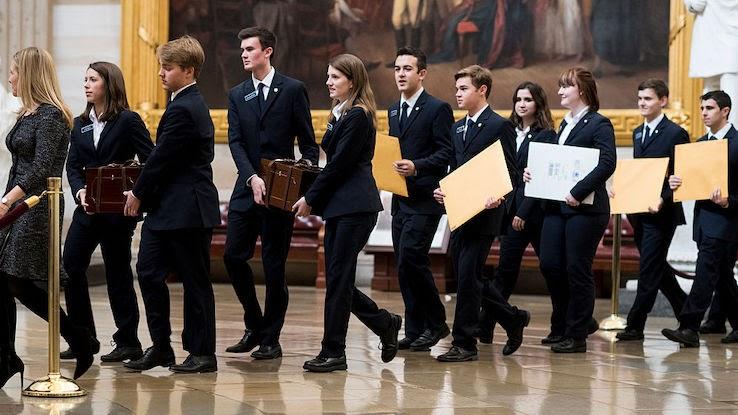
If the Electoral College is supposed to make candidates care more almost modest states, information technology fails at doing that. During the 2016 presidential election, two-thirds of all campaign events happened in the 6 fairly large states of Florida, Michigan, North Carolina, Ohio, Pennsylvania and Virginia. Those states combined with Arizona, Colorado, Iowa, Nevada, New Hampshire and Wisconsin accounted for 96% of entrada events for the 2016 election, and in total, 25 states — half of the states in the U.S. — didn't see whatever campaign events at all. Only not all of these were the smallest states, elector-wise, in the country. It'south like shooting fish in a barrel to run across how the Electoral Higher actively harms both small and large states. So who exactly does it help?
Does the Balloter College Favor Swing States?
The Electoral College works best not for states of any one size, but rather those that take a close-to-even mix of republican and democrat voters — those whose votes aren't consistently for the republican or democrat candidate from election to ballot just who might swing one way or the other. Considering most states award all of their electoral votes to whoever wins the popular vote in the country, it doesn't make sense for presidential candidates to give big or small states much attending if they're historically likely to vote for one party or the other.
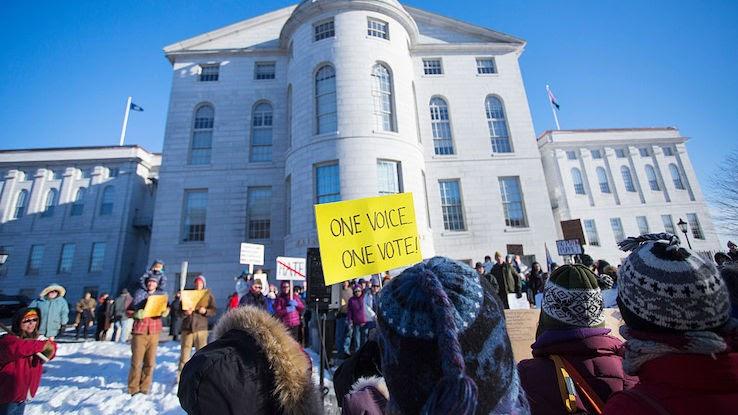
New York, for example, has only elected a republican for president six times since the Great Low, then despite the fact that it has the 3rd-largest number of electors, it's considered an uncontested blue state. And it doesn't make sense for a republican candidate to spend fourth dimension campaigning in such a democratic stronghold when they're highly unlikely to flip the vote. It does make sense, notwithstanding, for candidates to entrada in states that aren't staunchly red or blueish, just the result is that they subsequently focus much of their effort campaigning only in these swing states where there's no immediate guarantee they'll win or lose. The Electoral College ensures that this aforementioned limited puddle of swing states rather than the full union decides the fate of the state every four years equally candidates vie to flip votes by campaigning heavily in these areas. The organization "does not lead presidential candidates to cater to the interests of small states or large states. On the contrary, only states that randomly happen to have a close partisan rest get attention."
This discrepancy is also a factor in i of the near railed-against features of the Balloter College: It allows candidates to win the presidency even when a clear bulk of the state doesn't desire them in part. A candidate could bear witness unusually unpopular, with millions more voters not trusting them with the function of the presidency compared to those who do. If just a slim bulk of people in states like New Hampshire, Ohio or Florida support the candidate with fewer votes, it doesn't affair how many people in the residue of the country don't.
This happened to presidential candidates Andrew Jackson (1824), Samuel Tilden (1876), Al Gore (2000) and Hillary Clinton (2016). Despite more Americans wanting them in office, which was demonstrated by their higher vote counts when looking at the pop vote, a political organization designed to accommodate slavery and blowsy ideas virtually voting laws ended upwardly handing their opponents leadership of the nation. This effect besides doesn't only advantage one political party, either. In 2012, for case, while Barack Obama won the popular vote by 51.one% to Mitt Romney'south 47.2%, all states could have shifted 5.3% toward Romney — a clear pop bulk — and Obama still could have won because of where his votes came from and how the electors would've cast their votes.
What Can Nosotros Do About the Electoral College?
This is a hard question to reply considering the pathways themselves to the different options aren't hands surmountable. The most straightforward option — getting rid of the Balloter College outright — would demand to take identify through a constitutional subpoena. This would crave the support of at least two-thirds of the Senate, two-thirds of the Business firm of Representatives and ratification by three-quarters of the states. This could bear witness hard to achieve because some states (and Conservative voters in general) perceive the continuation of the Electoral College to put them at an advantage.
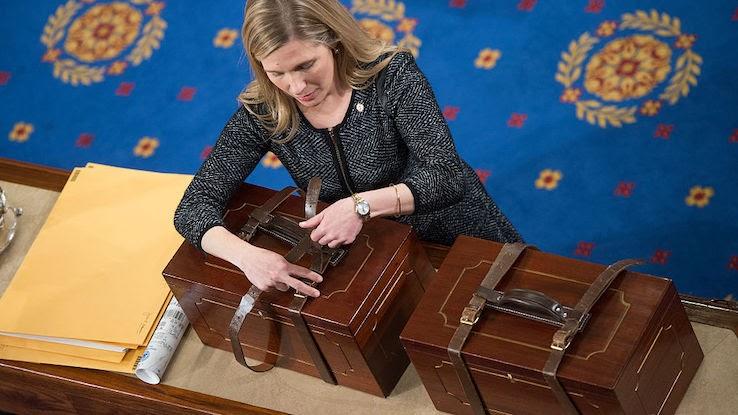
States could also accolade votes based on the candidate who wins each congressional district, like Maine and Nebraska practice. In theory, this gives politicians more incentive to attend to each state, as there are always at least some votes upwardly for grabs. Withal, because congressional districts are often gerrymandered — meaning their boundaries are plotted out in such a way as to advantage one party no affair how people vote — this could really make the Electoral Higher's furnishings worse. For case, Hillary Clinton won the national popular vote by ii% in 2016 but still lost in terms of balloter votes. Under a congressional commune method, Clinton could accept won the popular vote by as much as 5% and still lost the election. Eliminating the Electoral Higher and sticking to the concept of one person, i vote — a true popular vote — would exist fair, merely it would too be difficult to institute.
The National Pop Vote Interstate Compact May Be a Promising Solution
1 pick that could succeed may be the National Popular Vote Interstate Meaty (NPVIC). To bring together this agreement, states laissez passer a constabulary that binds their electoral votes to whichever candidate wins the national popular vote. The agreement only goes into result one time 270 electoral votes' worth of states sign on, and just 181 take to date. Should membership e'er reach that number, the Balloter College's furnishings volition essentially stop, fifty-fifty if the system itself remains in place. The number of people who actually support a candidate would become the deciding gene in who wins presidential elections rather than whether or not the candidate has a slight majority in battlefield states.
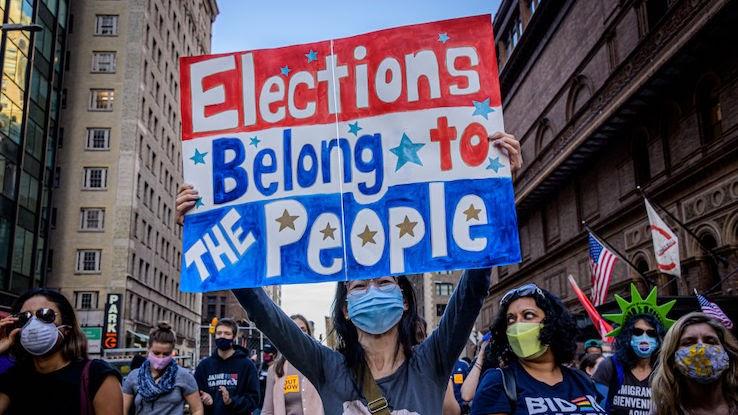
Critics of the NPVIC argue that smaller states would lose ability nether such a organisation, that the Electoral College already encourages politicians to ignore about of them. Some other concern is whether the agreement is constitutional; electors technically don't take to vote for the candidate their state voted for unless they've pledged to do so and could thus go "faithless electors" — which can see them facing fines and imprisonment, depending on the country they stand for. While some states take passed laws requiring electors to vote for the candidate who wins their state, the constitutionality of such laws was also uncertain for a long time. However, on July 6, 2020, the Supreme Court handed proponents of the NPVIC a major win when information technology ruled that states can require electors to vote a certain way.
The final fate of the Electoral College remains uncertain. Nevertheless, as slow equally their progress may sometimes feel, the regime and our election processes take inverse in the past — and when information technology comes to the electoral organisation, they seem primed to do so again, even if it takes some time.
Source: https://www.ask.com/culture/time-abolish-electoral-college?utm_content=params%3Ao%3D740004%26ad%3DdirN%26qo%3DserpIndex